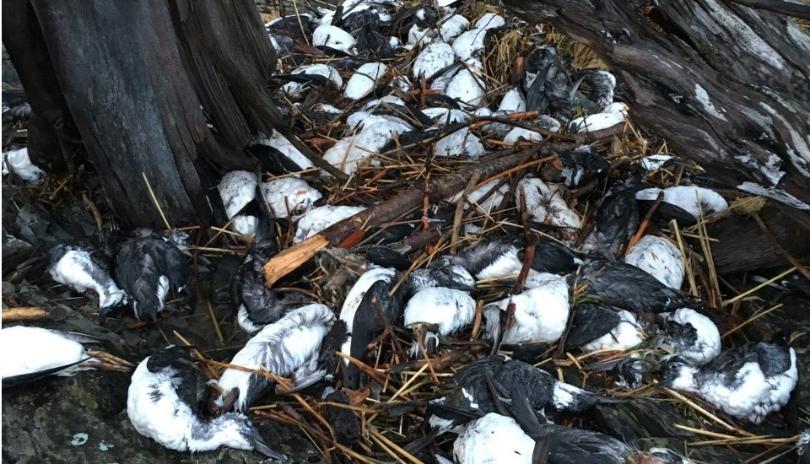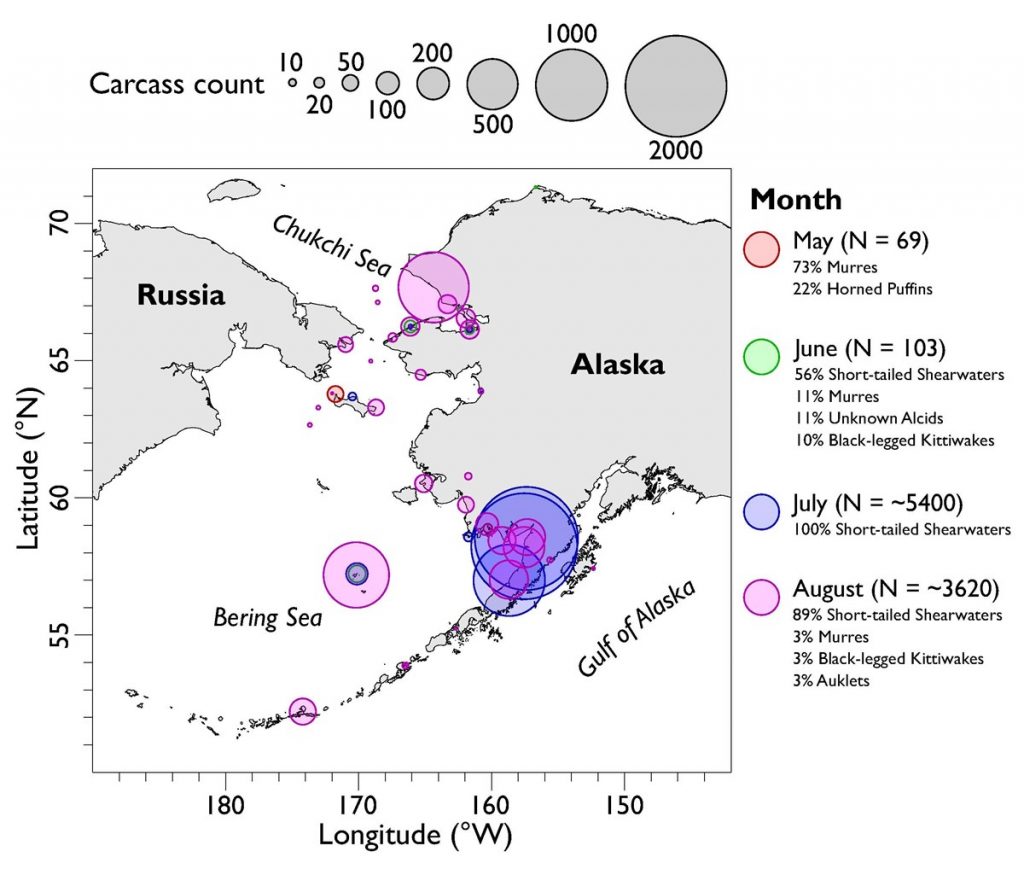It’s already the fifth year in a row that thousands of seabirds are washing up dead on Alaskan beaches.
And biologists only blame climate change as usual… And forget Fukushima radiation as a cause.

Animals are indicators of the ecosystem’s health. They are red flags that we have to pay attention to. There are many signs that the Alaskan ecosystem is slowly but surely collapsing. The latest example is the desastrous number of cods that prompted Alaskan officials to close its fishery in the Gulf in 2020.
Now, for the fifth year in a row, thousands of seabirds washed dead ashore, but scientists only blame ‘climate change’ as a cause and never propose Fukushima radiation as one of the possible origin of the die-offs. WTF!?!
Birds Are Dying Massively in Alaska
Some bird die-offs occur naturally once in a while. However what’s currently happening in Alaska is too massive with every year, at least a large bird kill. Seabirds are indicators of the ecosystem’s functions, if not ecosystem health. These are red flags that we have to pay attention to.
According to Arctic Today, the mass die-offs occur at different places and different seasons of the year for different species. Bus according to the same scientists the dead or dying birds are emaciated, and the die-offs correlate with a heat-up of the marine environment. Something like the Blob, maybe?

The latest victims are at least 9,200 short-tailed shearwaters, that started to show up on shorelines beginning of May 2019 in and north of the Bering Strait as well as in the Bristol Bay region of southwestern Alaska as described by the U.S. Fish and Wildlife Service and the National Park Service.
Some dead shearwaters were also found along Russia’s Chukotka Peninsula. Moreover, massive shearwater gatherings were reported last month in parts of the Gulf of Alaska – near Kenai Fjords and Glacier Bay National Parks as well as in the Kodiak region – which is not their usual summer and fall habitat.
But this is only the tip of the iceberg as most of the dead birds either sank or died in places where they were never seen by people.
Why Are Birds Dying in Alaska?
For scientists, the bird kills are all linked to high water and air temperatures pushed up by climate change.
1. Warmer Temperature Than Usual?
Scientists argue that Alaska’s biggest die-off of common murres in the Gulf of Alaska (2015 and 2016) was due to warmer temperatures than usual, hindering the birds to find food and lingering reproductive failures as well as reducing and redistributing their preys. Same for the other species of birds in the North.
2. Warmup and Ecological Transformation?
they further argue there is a dramatic warmup and ecological transformation in the region that is linked to long-term climate change.
Water temperatures are far warmer than normal and air temperatures have hit record highs, too.
The Bering Sea’s deepwater “cold pool” has almost disappeared and boreal species like pollock and Pacific cod are moving north, eating a lot of the same prey that the seabirds eat.
Algal blooms are increasing and release toxins in the water.
But Scientists Never Speak About Fukushima Radiation
This animation by the Woods Hole Oceanographic Institution WHOI show that radioactive contaminants from Fukushima are carried across the Pacific Ocean by currents and spread along the West Coast of North America by complex coastal processes.
Another study from 2012, found Fukushima Radiation in U.S. West Coast Tuna. The video below tells you more about those findings:
Although the concentration of contaminants is low and well below limits set by the U.S. EPA for cesium-137 in drinking water (7,400 Bq/m3) or even the highest level recorded in the Baltic Sea after Chernobyl (1,000 Bq/m3), they are there and they slowly kill and destroy the ecosystem.
Moreover, the bird die-offs coincide with other unusual marine die-offs in Alaska and bordering areas such as grey whales and ice seals. They are all swimming in the same nasty radioactive waters.
Meanwhile, radiation hotspots have been detected in Fukushima, where the torch relay for the Tokyo Olympics is due to begin:
And when I think about Japan releasing tons of radioactive water in the ocean, I just say the world is going crazy and ecosystems will continue to collapse but more rapidly.
Warmth is the usual suspect. But the mechanism is yet to be determined. And other possibilities such as Fukushima radiation should be investigated. Strange Sounds and Steve Quayle are here to keep you updated about dangerous events that are occuring right now.












